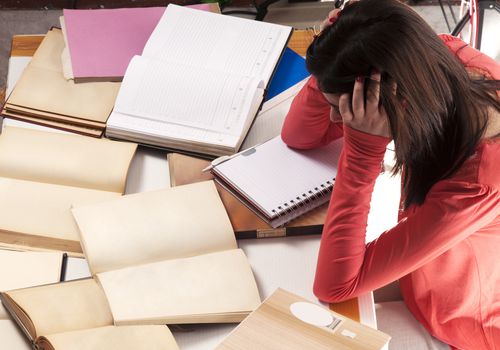Growing concern, school goers are receiving too much homework, leaving parents and children frustrated
Photo – Verywell Family
Johannesburg – Since schools have returned to normal, children have been bombarded with homework to make up for lost time. While this might be done with good intentions, parents fear the amount of work is causing more damage to kids than good.
Children can concentrate on a specific subject for a certain amount of time. Because of this, it is difficult to sit and work on something for long periods. A concerned father shared his frustrations of having to sit into the latter part of the night trying to help his child with homework.
“We start homework at around six, then they sit until about nine o’clock. And then there’s tempers that are flaring because a child can’t concentrate, which is normal for a child their age, who is between grade one and grade three. Their attention span is only so much and there’s only so much information that they can absorb.”
With both parents working, “our economy is such that both parents have to work, more often than not,” said one parent. The parent, who did not wish to be named, went on to say that those living in a single parent house must have it even harder. According to Stats SA, about 46% of children live in a single parent home.

While homework helps younger kids with reinforcement of leassons learned in class, too much can have negative results
In a Muslim household children attend madressah – Islamic school classes – in the afternoon. Managing both can be quite a challenge as Sakeena Ponto explained.
“My issue is that they get way too much homework, and as a Muslim my faith plays a huge role. We must make provision for our children to get Islamic learning in as well. Our kids basically have a full, twelve plus hours of non-stop learning at such an early age. This is something that causes mental breakdowns. I’ve heard mothers complaining that their children aren’t coping.”
What is homework and what are the benefits of it? According to Eric Atmore, Professor in the Department of Education Policy Studies at the University of Stellenbosch, homework is supposed to be part of school activities.
One of the big benefits of homework, Atmore explains, “Is that it teaches the child good study habits, and it enables the child to plan his or her own learning… Remember, homework is not for new learning. The homework should reinforce what has been covered in the class and in the playroom.”
Helping your child to understand their work is perfectly normal and fine. However, what is not acceptable is when parents do “the homework for their child,” said Atmore.
“We often see this in schools especially around projects where the parent wants to produce an absolutely brilliant project and does most of the thinking and doing for a child. I think homework can be very difficult if it’s imposed upon the child and if the parent forces the child to do it to a particular standard. Parents need to be supportive of their children around homework guiding, showing the way, providing a safe and quiet space where children can do their homework, encouraging the child, commenting positively on the progress that is made but it really is a parent and child matter. It cannot be left to the child to go and sit in a corner by herself and produce the homework that is required.”
In some cases, parents feel compelled to do homework. This stops a child from learning how to do that set of work. If a parent should find the homework too difficult or too long for their child, they should “communicate that with the school,” said Atmore.
“My advice to parents would be if you have a problem with homework either with the difficulty or with the length of time that it is taking, go and speak to the teacher in a supportive, non-confrontational way… if a child is struggling with the homework at home and it does not relate to the load but more to the content, parents can intervene but intervention must be in perspective and what that means is that the intervention must be to help the child through the problem. Not to answer the problem for the child.”
Teachers also must come to the table. Atmore issued a message to teachers to remind them that kids “have a life beyond the school. They have religious activities, they have sporting activities, they have social activities and all those very important skills that are developed at home.”
A class is filled with children from different economic backgrounds. Teachers need to keep this in mind when handing out assignments. It is important to always switch up homework tasks, so learners don’t feel bored.
“Teachers need to light the fire in their children’s thinking and in their creativity,” said Atmore.
“In a class of 25 or 30 children you will have children from varying backgrounds, different communities, and different economic groupings so it cannot be one size fits all…. A child has to have the resources at home to complete a specific task and teachers need to be cognisant and aware of it. Secondly, the homework tasks need to be of a variety. If it’s the same every day, for example writing and copying and doing the same thing, that gets a bit boring.”
Atmore explained that if two or more teachers manage a class, they need to be in constant contact because “teacher A does not know which homework tasks teacher B has given and a child could end up overloaded and that’s where you’ve got eight- and nine-year-old children doing two to three hours of homework and that is untenable and it’s not fair on the child.”
Wajiha Chohan, a foundation phase teacher, has started to use technology to her advantage. Her school has adopted a “no homework policy.” They have switched to an online form of learning to prepare for what the future may look like.
“However, we do give Google classroom homework once a week to get learners and parents used to an online platform as we don’t know what the future holds. With covid we have seen the importance of technology and many of us were not equipped or prepared for it. During assessment or exam season we prepare revision worksheets. In the foundation phase it is extremely helpful as parents don’t know what learners are doing in class and their books do not go home. The revision worksheets serve as a guideline to what work is being done and how it is done.”
Another educator explained further that there isn’t enough support within the current system to help teachers and students cope with the workload.
“If you dig deeper, there is no proper training given to intermediate and foundation phase teachers and due to this, many teachers lack the knowledge on how to teach. These kids are expected, at an early age, to work countless hours at school, and then come home and do the same. They have no time to play. Mainstream schools want a pass rate and need to submit lesson plans and papers as proof that they have done the work. However, that’s all on paper. When it comes down to the student, they are not given the support needed.”
The teachers spoken to also expressed that giving kids homework they cannot understand “defeats the purpose”.
“Another issue we find is a lot of “assignments” have been given to students. These are then done by parents or an older student and then handed in to the teacher. The teacher marks accordingly. Now what of the students who put in the effort and did it by themselves? Their marks are affected.”
Educators agree with Atmore when it comes to homework being understandable to kids. Chohan explained that although homework is supervised, learners “should be able to complete tasks on their own as homework”.
“In the foundation phase we do instruct that homework must be supervised, meaning that instructions must be read, and learners should be able to complete tasks on their own as homework is revision and extension of classwork. Oral work does require full supervision and support as this gives the parents a good idea of what is lacking and what requires more attention.”
Chohan as well as other educators agree that homework “is a revision and extension of class work,” and its purpose is to help learners grasp the concepts. It also helps a student “learn some sort of responsibility by doing a task that has been given to them,” said another educator.
The level of homework should be easy for children to understand. If parents attempt to instruct their kids, they “teach the concept in a way that is no longer used or caps compliant. Once something is taught and learnt, it’s very difficult to undo this and reteach.”
Homework is necessary for learners to grasp a concept and learn it. However, as Atmore pointed out, the problem with homework is when teachers don’t communicate effectively, and a child is left with three to four hours of homework. That not only adds pressure to his parents but also takes time away from them to develop social skills. Homework is necessary but too much can cause a big problem down the line.
Listen to Mariam Mia speak with Professor Eric Atmore here:
